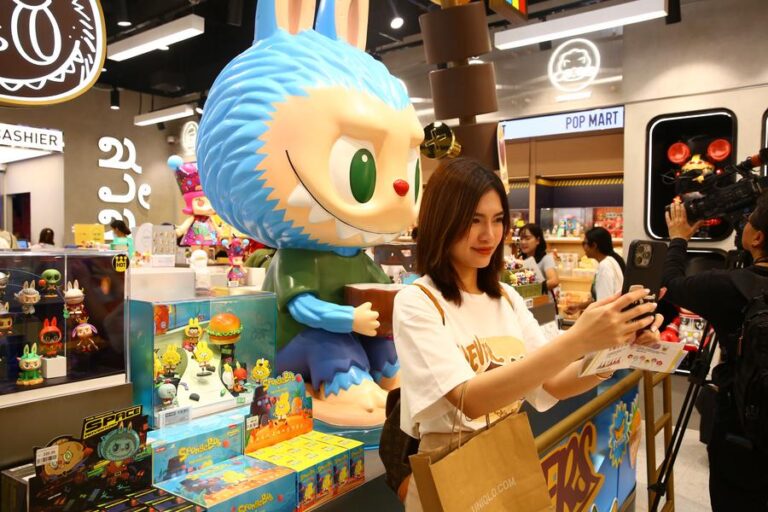BEIJING, June 12 (Xinhua) — When the same toothy little monster appears dangling on Rihanna’s purse and in David Beckham’s social media post, and its hashtag racks up over 1 billion views on TikTok, it’s clear this designer toy’s global takeover is complete.
Labubu, a spiky-toothed, mischievous imp manufactured in factories in south China’s Dongguan and marketed by Beijing-based toy giant Pop Mart, is telling a Chinese IP globalization story in an unexpected way.
Originally priced at 99 yuan (about 14 U.S. dollars), Labubu’s 3.0 blind boxes have vanished from shelves at home, while resale markets see common variants triple in value and rare editions surge 30-fold to 3,000 yuan.
This nine-toothed creature has also sparked a global frenzy, from Los Angeles to London, Milan to Tokyo, snaking queues form outside Pop Mart stores worldwide — some stores even witnessing frenzied scrambles for the coveted figurines. JPMorgan has even described Labubu as “the next Hello Kitty.”
Under Labubu’s spell, Pop Mart’s “The Monsters” franchise saw revenues soar past 3 billion yuan in 2024, a staggering 726.6 percent leap, crowning it as Pop Mart’s top-performing IP. Investor enthusiasm surged in tandem: Pop Mart’s share price has surged, lifting its market capitalization to over 300 billion Hong Kong dollars (approximately 38 billion U.S. dollars). The boom also catapulted founder Wang Ning into the ranks of China’s wealthiest.
This surge is no mere accident. Beneath the playful craze lies a deeper shift in youthful consumption: a shift from utility to emotional resonance, from price tags to personal identity.
A MONSTER OF EMOTIONAL RESONANCE
Created by Hong Kong artist Kasing Lung, Labubu defies traditional cuteness. With large ears and a fixed grin featuring nine pointy teeth, its oddball charm resonates with a young generation that sees itself in its mischievous, soft-hearted persona.
“It’s weird-looking, and that leering grin borders on creepy,” said Dingding, a senior at Zhejiang University. “But that’s exactly why I love its defiant attitude.”
This “rebellious cuteness” mirrors the emotional complexity of modern youth. Cheng Fei, a Shanghai-based indie designer, said that in an era flooded with cuteness, Labubu’s deliberate anti-aesthetic has become its strongest selling point.
While Labubu’s design sparks instant emotional connection, the blind box model adds emotional suspense: you never know what you’ll get, and the thrill of unboxing a hidden edition feeds the dopamine loop. Compared to traditional toys, these collectibles offer more emotional value.
Emotional spending is a growing trend among young people worldwide. A China Consumers Association report noted that emotional release is now a key driver in the purchasing decisions of young people. “The rush of tearing open the box — it’s like betting on fate,” said Guangzhou-based buyer A Yuan, who once drew a hidden edition on her first try. “It felt like my luck had turned.”
FROM FACTORY TO CULTURAL FRONTIER
Labubu has helped shatter the stereotype of Chinese manufacturing as merely cheap and functional. While China has long been the world’s factory, few domestic toy brands had global recognition — until now.
Labubu’s explosive popularity today not only marks a leap in China’s design capabilities but also signals the emergence of Chinese brands in the global race to build super IPs.
Wang has said he wants to create “the world’s Pop Mart, not anyone’s copycat.” Labubu’s runaway success appears to have created a blueprint for this globalization strategy.
Exporting Chinese IP has long been seen as challenging due to cultural and aesthetic differences. But Labubu offers a workaround — its design has “low cultural thresholds,” making it emotionally accessible to diverse audiences, according to a cultural industry researcher.
Labubu is not tied to a fixed storyline, allowing fans to project their own meaning onto it. “Many young people are telling their own stories through Labubu,” Wang said. The open-ended narrative also fuels user-generated content and a secondary market, from custom outfits to beauty treatments like fake lashes and rhinestone teeth.
Gu Huijie, who runs a business in Yiwu specializing in doll accessories and outfits, said, “Over half of our orders come from overseas, and the vast majority of our products are headed to the United States.” She attributes the surge in demand to the launch of the new Labubu series.
Notably, Labubu’s global expansion is deeply localized. Pop Mart has released special Labubu editions customized for different countries, including the Merlion edition for Singapore, the edition dressed in traditional Thai attire for Thailand, and the matador edition for Spain. These one-market-one-plan efforts retain the IP’s core identity while catering to local tastes.
Labubu’s rise from a niche collectible to a cultural icon exemplifies China’s growing creative confidence. Nevertheless, the country’s creative prowess has transcended the designer toy boom, with breakthroughs reshaping global industries.
The animated blockbuster “Ne Zha 2” has soared into the top five worldwide box office earners; DeepSeek is reshaping the global AI landscape; “Love and Deepspace,” a Chinese-developed hit mobile game, has climbed bestseller charts in multiple countries — all proving “Created in China” is no longer playing catch-up, but setting the pace. ■

